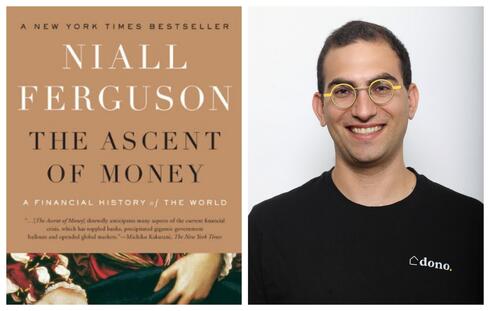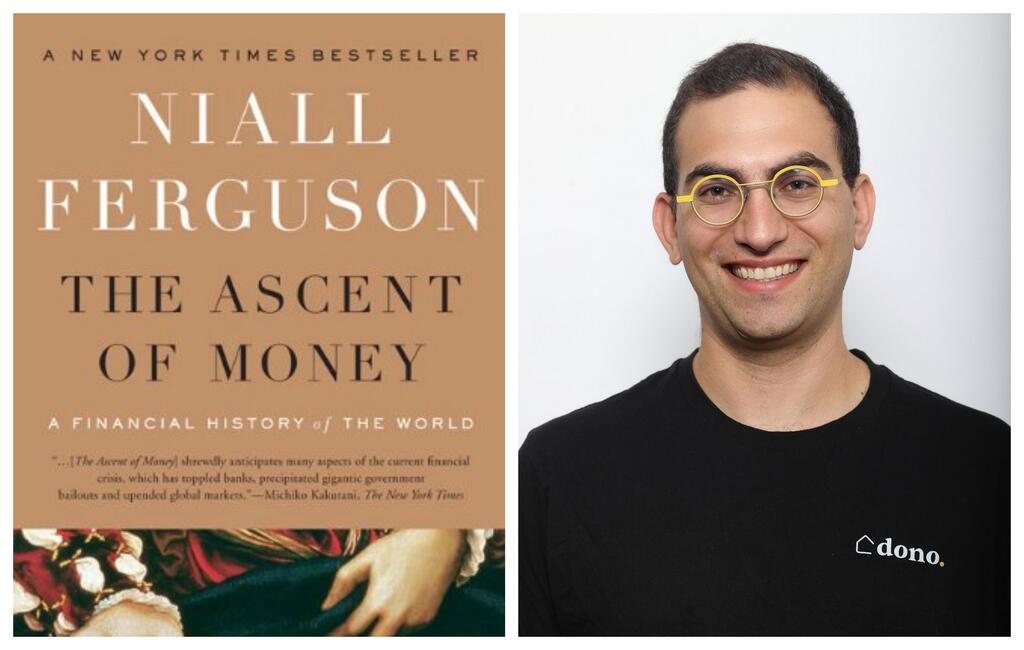
BiblioTech
CTech’s Book Review: Understanding the foundations of finance
Tali Gross, CEO of Dono, has joined CTech to share a review of “The Ascent of Money” by Niall Ferguson
Tali Gross is the CEO of Dono, an AI-powered homeownership verification platform. He has joined CTech to share a review of “The Ascent of Money” by Niall Ferguson.
Title: “The Ascent of Money”
Author: Niall Ferguson
Format: Book
Where: Vacation
Summary:
Niall Ferguson's "The Ascent of Money" is a profound exploration into the evolution and impact of the financial world, tracing the history of money from ancient times to the modern era. Ferguson reveals how financial instruments—currency, bonds, stocks, mortgages, and insurance—have developed over the centuries to become the foundations of our economic and social systems.
Ferguson uses pivotal historical moments to illustrate his points, such as the impact of the financial system on outcomes like the American Civil War, where the Confederacy's lack of financial credibility significantly weakened its military capacity. Such examples underscore the crucial role finance plays in historical and contemporary geopolitics.
A significant portion of the book discusses the modern financial era, marked by innovations and failures that have reshaped economies. For instance, Ferguson examines the catastrophic failure of LTCM, a hedge fund that relied heavily on the Black-Scholes model. Its collapse underlines the dangers of over-reliance on mathematical models without considering broader economic and human factors.
Ferguson argues that at the heart of the financial system lies trust—without which, even the most solid agreements can falter. This theme resonates throughout the book, emphasizing that financial systems not only reflect but also influence human behavior and governance.
"The Ascent of Money" provides an insightful analysis of how deeply finance is woven into the fabric of our history and daily lives, highlighting both its power and its pitfalls.
Important themes:
In "The Ascent of Money," Niall Ferguson explores several key themes that illustrate the intricate relationship between financial history and societal development. These themes underscore the transformative power of financial instruments and the consequences of their evolution.
Financial Innovation and Economic Power: Ferguson traces the roots of various financial instruments, such as banks, stock markets, and insurance companies, showing how they originated and evolved over time. Each innovation, from the creation of bonds in Renaissance Italy to the development of derivatives in the 20th century, not only reshaped economies but also shifted balances of power both within and between societies. This theme highlights the critical role financial technologies play in economic development.
Global Impact of Financial Crises: The book delves into how financial crises have been pivotal in shaping the modern economic landscape. By examining events like the Great Depression and the 2008 financial meltdown, Ferguson demonstrates how these crises have profound global impacts, influencing everything from policy reforms to individual livelihoods, and often leading to significant political and economic shifts.
The Double-Edged Sword of Credit: Credit is presented as both a vital economic tool and a potential source of danger. Ferguson discusses how access to credit can drive economic growth and prosperity but also notes that over-reliance on credit can lead to devastating financial bubbles and crashes. This theme reflects the delicate balance needed in credit markets to harness its benefits while mitigating its risks.
Economic Disparities and Financial Systems: The book also touches on how financial systems can both bridge and widen economic disparities. Through examples from history, Ferguson shows that while financial systems can enable upward mobility and wealth creation, they can also entrench existing inequalities and leave certain groups vulnerable.
What I’ve learned:
I learned a few interesting lessons from the book, primarily concerning the nuanced interplay between finance and human behavior. The book highlights two essential aspects: the indispensable role of trust in financial systems and the dynamic tension between rationality and irrationality in financial markets.
Trust as the Foundation of Finance:
Trust is fundamental to any financial system's effectiveness. The collapse of LTCM vividly illustrates this point. Despite its foundation in the rigorous Black-Scholes model and support from financial experts, the hedge fund failed due to a breakdown in trust and excessive reliance on historical data, underscoring the vulnerability of financial ventures without solid trust.
The Balance of Rationality and Irrationality:
The book also illuminates the ongoing conflict between rational financial models and the erratic nature of market behaviors. LTCM’s failure highlighted this conflict, as overconfidence in historical trends blinded its management to the market's irrational forces, demonstrating the limitations of financial models in predicting real-world outcomes.
These lessons emphasize that understanding finance goes beyond numbers. It involves appreciating the profound impact of human nature and trust. Ferguson’s narrative shows that while financial missteps are costly, they also provide valuable learning opportunities, enriching our approach to navigating complex financial landscapes.
Critiques:
There is a constant tension in semi-academic writing between quotes and references versus a smooth narrative. My feeling as an average reader is that often the author gets dragged into relying too much on and delving into small details that aren't interesting or relevant to the average reader. This might make the reading flow a bit heavy. Personally, I just skip these parts, but for those who tend to linger on every word, the enjoyment of reading might decrease. I'll add a small recommendation here (which I read somewhere but can't remember where): in general, when reading, know how to skip to the parts that interest you more and not try to remember the book too much.
Who should read this book:
Anyone trying to understand the fundamental building blocks of the financial world, and perhaps in general, anyone trying to understand the basic building blocks of our world...














